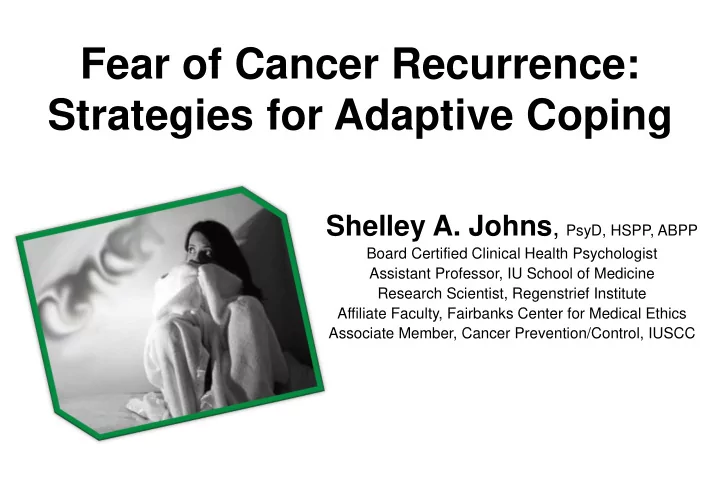

Fear of Cancer Recurrence: Strategies for Adaptive Coping Shelley A. Johns , PsyD, HSPP, ABPP Board Certified Clinical Health Psychologist Assistant Professor, IU School of Medicine Research Scientist, Regenstrief Institute Affiliate Faculty, Fairbanks Center for Medical Ethics Associate Member, Cancer Prevention/Control, IUSCC
Agenda • Defining fear of cancer recurrence (FCR) • Significance of the problem • Assessing YOUR fear • Strategies for adaptive coping • Mindfulness • Values-based action
Fear of Cancer Recurrence (FCR) Lebel et al, 2016 “Fear , worry, or concern about cancer returning or progressing .”
Significance • Prevalence – Mild/transient FCR is almost universal. – 40-70% of survivors report clinically significant FCR (Thewes et al., 2012; NCCN Survivorship Guidelines, 2015). • Trajectory – FCR remains stable over the survivorship trajectory, even when risk of recurrence is low (Simard et al., 2013). • Unmet need – FCR is the most frequently endorsed unmet supportive care need among survivors (Armes et al., 2009; Harrison et al., 2011; Hodgkinson et al., 2007).
Higher FCR Is Associated With… – Younger age – Children still at home – Number/severity of symptoms – Medical comorbidities – Lower quality of life – Higher perceived risk of recurrence – Need for more support – Positive health behavior – More healthcare visits change (e.g., healthier diet, sunscreen use, avoiding tobacco, continuation of treatment)
Health Service Usage Among Survivors • High FCR is associated with excessive threat monitoring: – Hyper-vigilant self-examination – Requests for unnecessary scans – Greater number of unscheduled outpatient medical visits – Greater number of ER/ED visits – Greater use of counseling, support groups, and CAM interventions – Higher health care costs • High FCR is also associated with avoidant coping: • Of cancer screening, regular check-ups, and other medical tests • May compromise health outcomes. Thewes et al., 2012; Lebel et al., 2013
Experiential Exercise #1 Assessing YOUR Fear with FCR-7
FCR-7 Scoring • Add scores for each of the 7 questions. Not at all A little Sometimes A lot All the time 1 2 3 4 5 □ □ □ □ □ 1. I am afraid that my cancer may recur. • Total scores ≥ 17 = “clinically significant” fear. • Total scores ≥ 27 = “severe” fear. Support is available!
Adaptive Coping Strategies
Experiential Exercise #2
Experiential Exercise #3
Experiential Exercise #4
“Experiential” Exercise #5
Protective Factors
Opportunities • Healthy IU – https://healthy.iu.edu/ – Mindfulness, resiliency, fitness, nutrition counseling, caregiver support, etc … • Eskenazi Health – Fear of Recurrence 4-week Resiliency course - next offering in June! – See flier for details – email sheljohn@iu.edu • IU Simon Cancer Center – “First Mondays” support groups – call 317-944-0301 • Cancer Support Community – http://cancersupportindy.org/ • – https://www.cancercare.org/
Experiential Exercise #6
THANK YOU To YOU for your participation. To Healthy IU for caring about cancer survivors.
Recommend
More recommend